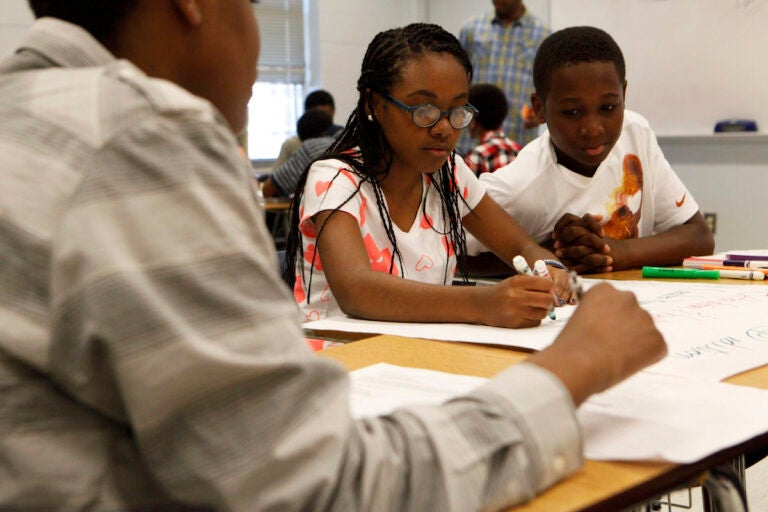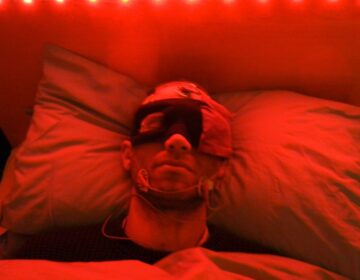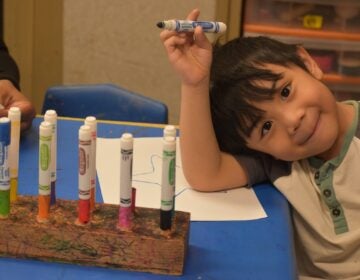Why some researchers are approaching giftedness as a form of neurodivergence - and what that means for ‘gifted burnout’
Research has found that giftedness can look a lot like different types of neurodivergence in the brain.
Listen 20:28
Shina Smith, 13, left, and Chris Douglass, 13, are two of 50 incoming students participating in Westlake High School's "Come West 9" summer program intended to reach out to gifted students in pursuit of a college education in Atlanta. (AP Photo/Jaime Henry-White)
This story is from The Pulse, a weekly health and science podcast.
Find it on Apple Podcasts, Spotify, or wherever you get your podcasts.
Being identified as “gifted” in school has long been associated with certain traits — high IQ, good grades, and future achievement. This understanding has been prominent ever since psychologist Lewis Terman — known as the “father of gifted education” — began publishing the results of his seminal study, “Genetic Studies of Genius.” Throughout the decades-long research project, which he launched in 1921, Terman followed roughly 1,500 high-IQ subjects from childhood through to old age, looking at their academic performance, interests, personalities, and relationships to show that gifted children were born leaders whose intelligence deserved to be recognized and cultivated through special education.
That idea gained increasing steam with the launch of Sputnik in 1957, which spurred the U.S. government to invest federal funds into gifted education in an effort to keep up with the Soviets. To this day, many U.S. school districts have special programs for gifted children.
But new research is changing the way we understand what it means to be gifted.
“One thing we know about giftedness is that it is quite literally a different brain — it’s a piece of neurodivergence,” said psychologist Matt Zakreski, a former gifted kid himself who now works with and consults on the topic of gifted children.
Zakreski says the field of giftedness has been changing over the past decade or so, thanks in part to fMRI studies showing that the brains of gifted children are physically different. This research could explain the challenges some gifted children experience, both with social and emotional issues, and with so-called “gifted burnout” — which, in some cases, leads to kids crashing and burning after a promising start.
The result — deep feelings of inadequacy and failure among teens and young adults who feel like they’ve wasted their potential, and failed at the one thing they were destined to do.
How brain differences manifest
Take a typical 10-year-old child — they’re 10 physically, intellectually, emotionally, and socially. But gifted kids’ brains develop differently — or asynchronously, according to Zakreski.
“There’s so much developmental energy that goes to the top part of the brain, the cerebral cortex, that other things lag, because there’s only so much energy to go around,” he said. “So that same 10-year-old, if they’re gifted, will be intellectually 15, academically 14, socially nine, emotionally eight.”
For example, studies have found that gifted kids have greater volume and connectivity in their cerebral cortex, which allows them to absorb and process information faster. And they have this “info sponge” phase for longer than other kids.
Subscribe to The Pulse
The downside is that, because their brains take in so much information and process it so quickly, further development of the prefrontal cortex gets slowed down. Essentially, there’s a bottleneck because the prefrontal cortex is overwhelmed, in addition to being developmentally delayed compared to the rest of the brain. This is one reason why scientists think that a lot of gifted kids struggle with executive functioning — the ability to prioritize, manage time, stay focused and organized — not to mention social skills and emotional regulation. In fact, in a lot of cases, Zakreski says, gifted brains can look a lot like other kinds of neurodivergent brains.
“Now we’re seeing that there’s so much overlap between autistic brains and ADHD brains and gifted brains and dyslexic brains,” he said. “And you might have all of them.”
A lot of times, gifted kids are smart enough that they can compensate for and even mask those deficits. But eventually, a lot of them end up hitting a wall.
This happened to Michael Winkler, who grew up in Pennsylvania. He hated school from the beginning.
“I always have really struggled focusing and being patient,” Winkler said.
The material bored him, and he felt like he already knew most of the things that were being covered in class. He distracted himself by talking, reading books he had hidden in his desk, and practicing his burgeoning daredevil act.
“I got really good at juggling my pencils,” he said. “I would sit there and spin them up in the air, and see how many times I could rotate them and catch them. I still have graphite tattoos in my palms, from the sharp pencils coming down and embedding themselves in my palm.”
By second grade, Winkler was identified as gifted, and began attending an enrichment program about once a week. It was stimulating and fun, but he still did poorly in his other classes. After transferring to a private school with less rigid rules, Winkler graduated and headed to college — where his grades absolutely tanked.
“My GPA was so low my first semester freshman year that they just immediately dismissed me from the school,” he said. “I think I had a 0.7 my first semester.”
Falling off the performance cliff
This kind of “crash and burn” or “performance cliff” isn’t uncommon among gifted kids. There are entire online communities dedicated to the experiences of formerly gifted kids, in which this issue comes up frequently.
One reason, psychologist Matt Zakreski says, is that a lot of gifted children never learn how to study. They get used to being able to absorb things easily and not having to put much effort into academics — until, usually in high school or college, classes suddenly get a lot more challenging.
“You never learn things like grit, study skills, asking for help, tolerating failure, because you’re never meaningfully challenged,” Zakreski said. “School is built to reach that level for most kids a lot earlier. Second grade, third grade, fourth grade.”
For some gifted kids, the performance cliff is the end of the line. Zakreski has multiple stories of gifted kids who ended up dropping out of high school or college, and now work minimum-wage jobs — or can’t manage to keep minimum-wage jobs because they’re lacking in people skills or emotional regulation.
Winkler, however, eventually figured things out. He ended up taking a year off, spending his days taking continuing education classes and learning how to study by day, and his nights working as a forklift operator. After graduating college, he spent his 20s in China, living a bohemian-style life. These days, he’s back in the U.S., where he works in technology services at a fancy hotel.
But unlike many of his formerly gifted peers, who find themselves tortured over the notion that they’ve wasted their intellectual potential Winkler is happy with where he ended up.
“I know that I probably had the processing ability to live a different life but I’ve never felt like that was my calling and I missed out on it or anything.”
Perfectionism, burnout, and other pitfalls of giftedness
Zakreski says for kids who care deeply about academics — especially the ones who end up at elite colleges, surrounded by equally intelligent classmates who did learn how to study and work hard — academic failure can be a profoundly destabilizing experience.
“In the absence of a better narrative, most gifted people who are used to solving their own problems through just sheer force of will, go, ‘I must be broken, I must be deficient. There’s something wrong with me now,’” he said.
For kids whose entire sense of self and self-worth is invested in their intelligence, this can feel disastrous — even if their perceived failures aren’t failures at all.
Take, for example, a man who asked to be called “Brian” to protect his identity and privacy. In a lot of ways, Brian’s path sounds like a gifted success story — he was identified as gifted at a young age, sailed through most of school, got his PhD, and is currently completing a postdoc at the prestigious National Institutes of Health.
But in college, Brian began to face mental health struggles. He was majoring in pre-med — a rigorous and competitive program that ate up all his energy — and felt like he was barely staying afloat. He began to feel out-of-place and alienated — and worse, like a failure compared to his classmates, who seemed to be better at everything, especially when it came to their social lives.
“Not only can they get excellent grades, but they can also do all sorts of extracurricular and leadership roles, do research, and then still have the time to party on weekends,” Brian said. “ I just felt like it was just too much. I couldn’t keep up with it.”
Brian’s mental health took a nosedive his senior year of college.
“I was getting into this big mental doom loop of spiraling into comparison, and thinking that I’m a loser,” he said.
Eventually, he ended up not going to med school, which was his original plan, and instead getting his PhD in medicinal chemistry.
Brian says he finds his position at the NIH interesting, challenging, and fulfilling; but despite that, he still can’t help feeling like he’s wasting his potential. In one Reddit post, he summarized it this way: “I just feel that ever since I started prioritizing work-life balance, I’ve started to become less and less impressive in terms of accomplishments relative to my intelligence. I know that people of my intelligence are doing what I view to be much more impressive things than I am.”
Psychologist Matt Zakreski says this anxiety about “wasted potential” is a direct result of both the pressure we put on gifted kids, and the way their brains work. Not only have gifted kids been told their whole lives that they’re destined for greatness, some studies suggest that their brains are wired for both emotional intensity, and black-and-white thinking. The result? Perfectionism.
”There’s this idea that if you’re not the best you’re a failure,” said Zakreski. “And I think it’s probably, pound-for-pound, the biggest source of burnout.”
Zakreski spends a lot of time with his clients convincing them that life isn’t ranked on a four-point scale, reassuring them that there is no “best” doctor or lawyer or artist or CEO. But he says that kind of thinking can be hard to unwind. Many of the people he works with feel constant pressure to do more, do better.
“I mean, it’s the hamster wheel of doom, right?” he said. “It’s like, you just go faster and faster and faster and faster until it flings you off.”
Zakreski says the most widely quoted figure about the percentage of gifted kids who end up burned-out and unhappy is one out of six — though he thinks that number is a lot higher.
Changing gifted education and supporting gifted kids
Zakreski says it’s important to take a more holistic approach to gifted kids — especially in educational settings. It’s essential, he says, to stop thinking of them as just future engines of achievement, but as whole people, with the specific needs and deficits that many neurodivergent people face.
“The good news is that the best practices in gifted education are just the best practices in education,” he said.
Zakreski suggests five changes to make educational settings more supportive for gifted children:
- Level setting — dividing kids into classes based not on their age, but on how advanced they are in a given subject.
- Curriculum compacting — tailoring learning materials to cut out the content that gifted kids have already mastered, and replacing it with related enrichment or activities. Zakreski says this approach allows kids to move through material faster, while allowing time for creativity, and the hands-on application of what they’re learning.
- Bringing back classes like shop, art, and music — subjects that allow kids to be creative, and to explore their interests and talents in hands-on, self-directed ways.
- Getting rid of homework.”Homework’s terrible. Kids hate it and it burns them out,” Zakreski said.
- Ditching traditional grading in favor of qualitative grading, which provides detailed feedback and suggestions for improvement, rather than letter or number grades. This, Zakreski said, is essential to stopping kids from getting fixated on grades and achievement, and focusing instead on the actual learning.
This fixation on achievement is something Brian is struggling with right now — the idea that he needs to be the best. He says if he has children, and they’re gifted, he’ll want them to have a different experience from his own.
“You don’t need to fulfill all of your potential, because trying to fulfill 100% of your potential could be very detrimental to your health,” he said. “And in the end, your health is going to matter more than all of the accolades and accomplishments and whatever that you get throughout life. They’re great, but only if you do so in a healthy way.”
WHYY is your source for fact-based, in-depth journalism and information. As a nonprofit organization, we rely on financial support from readers like you. Please give today.







